北师大版初三英语第6讲:unit 3 语法篇(学生版)
北师大版英语九年级全册Lesson6TomSawyer优秀教学案例
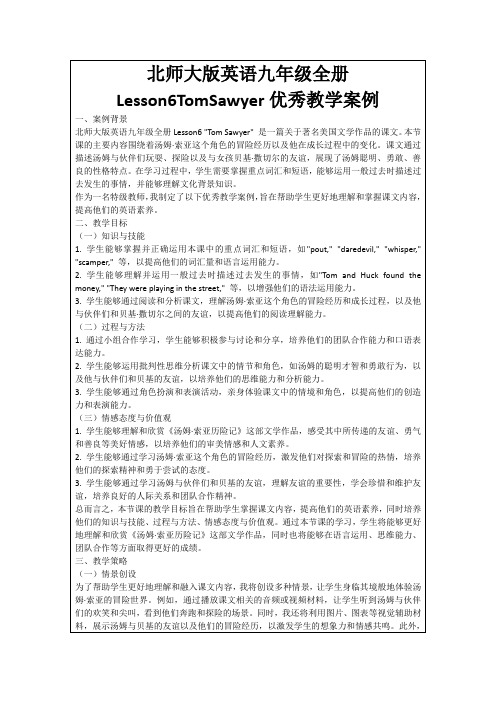
我提出了一系列问题,引导学生深入思考和分析课文内容。这些问题既涵盖了课文的主要情节和角色,也涉及了汤姆·索亚的性格特点和成长过程。通过回答这些问题,学生不仅能够更好地理解汤姆的冒险经历和与贝基的友谊,还能够深入思考汤姆的性格特点和成长过程,提高他们的思维能力和分析能力。
3.小组合作的互动和合作
作为一名特级教师,我制定了以下优秀教学案例,旨在帮助学生更好地理解和掌握课文内容,提高他们的英语素养。
二、教学目标
(一)知识与技能
1.学生能够掌握并正确运用本课中的重点词汇和短语,如"pout," "daredevil," "whisper," "scamper,"等,以提高他们的词汇量和语言运用能力。
(四)总结归纳
在学生小组讨论之后,我将进行总结归纳。我会邀请学生分享他们在讨论中的发现和感受,并引导他们总结课文的主要内容和主题。例如,我们可以一起总结汤姆·索亚的冒险经历,以及他在成长过程中的变化。通过总结归纳,学生将能够更好地理解和记忆课文内容,提高他们的思维能力和分析能力。
(五)作业小结
在总结归纳之后,我将布置作业小结。我会让学生选择一个他们最喜欢的冒险故事,并写一篇短文描述故事的情节和他们的感受。通过这样的作业,学生将能够巩固所学的知识,提高他们的写作能力和表达能力。同时,我还会鼓励学生在作业中运用他们学到的词汇和语法知识,以增强他们的语言运用能力。
5.教学内容的全面性和深入性
本节课的教学内容涵盖了课文的主要情节、角色和主题,通过导入新课、讲授新知、学生小组讨论、总结归纳和作业小结等环节,全面而深入地教授了课文内容。这样的教学内容设计使得学生能够全面地理解和掌握课文知识,提高他们的英语素养和综合能力。
【教育资料】北师大版初二(上)英语第6讲:unit 3 语法篇(教师版)-学习专用
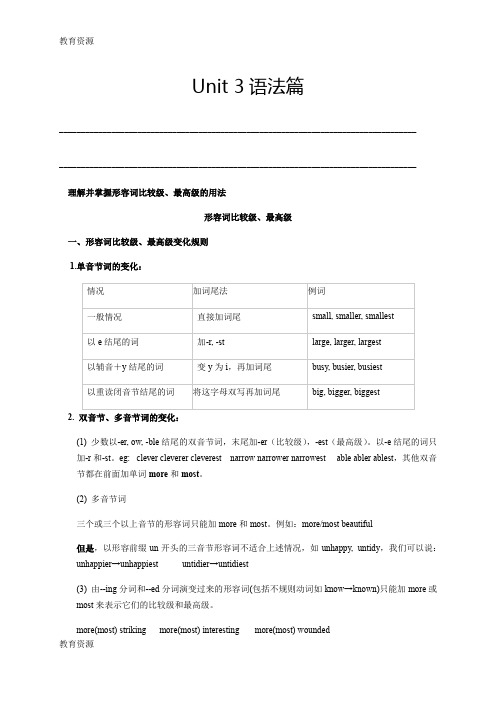
Unit 3语法篇____________________________________________________________________________________________________________________________________________________________________ 理解并掌握形容词比较级、最高级的用法形容词比较级、最高级一、形容词比较级、最高级变化规则1.单音节词的变化:2. 双音节、多音节词的变化:(1) 少数以-er, ow, -ble结尾的双音节词,末尾加-er(比较级),-est(最高级)。
以-e结尾的词只加-r和-st。
eg: clever cleverer cleverest narrow narrower narrowest able abler ablest,其他双音节都在前面加单词more和most。
(2) 多音节词三个或三个以上音节的形容词只能加more和most。
例如:more/most beautiful但是,以形容前缀un开头的三音节形容词不适合上述情况,如unhappy, untidy,我们可以说:unhappier→unhappiest untidier→untidiest(3) 由--ing分词和--ed分词演变过来的形容词(包括不规则动词如know→known)只能加more或most来表示它们的比较级和最高级。
more(most) striking more(most) interesting more(most) wounded3. 不规则形式bestworstmany /much mostleastfurthestold older oldest /elder eldest二、形容词原级、比较级和最高级的用法1. 形容词原级用法:(1)修饰原级的词:very, too, so, quite(2)同级比较as + adj 原级+ as 例如:Tom is as tall as Mike. Tom和Mike一样高。
北师版初二(下)英语第6讲:Unit3语法篇(教师版)

Unit 3 语法篇____________________________________________________________________________________________________________________________________________________________________学生通过本讲学习,能够掌握本单元的重点词汇句型,并在综合能力上有一定的拓展。
在完成时的结构现在完成时由“have/has+过去分词”构成,主要有两个含义:① 表示动作发生在过去,但与现在的情况有联系,有时无时间状语,有时和一些表示不确定的过去时间状语连用,如:many times,just,yet,ever,never,just,already,before,so far, by now等连用。
②表示从过去某一时间开始一直延续到现在并还可能继续延续下去的动作,用于延续性动词,且句中常带有表示一段时间的时间状语,如:since + 时间点/从句,for two months, so far等。
1)现在完成时和一般过去时都能表示过去发生过的动作,但现在完成时表示过去动作对现在的影响,并且表示这一动作已完成或还可能继续下去;2)而一般过去时与现在的情况没有联系,仅表示过去的动作,且这一动作到说话时已终止。
因此现在完成时不能与表示明确的过去时间如:in1949,yesterday,last week等的状语连用,并且用when或where对这些时间和地点状语提问时,一般只用一般过去时。
三、在“it is first/second...time that...。
”或在“it/this/that is the +最高级+名词+that...。
”结构中,that从句中的动词常用现在完成时;在“it + be ...+since从句”这一结构中,be可用一般现在时或现在完成时,since从句一般用过去时。
新北师大版九年级英语第三单元讲解
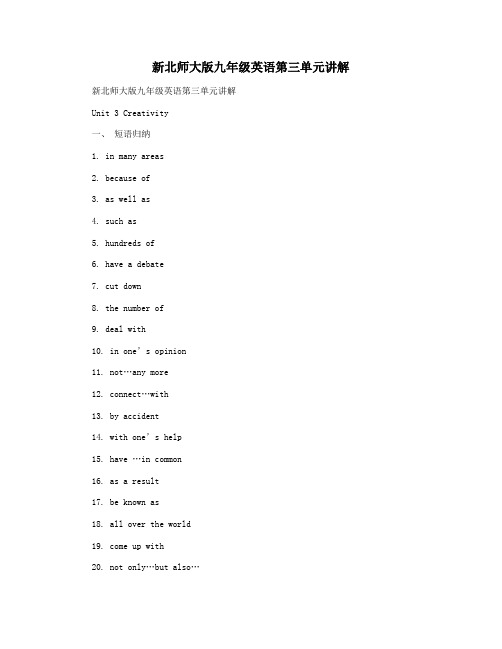
新北师大版九年级英语第三单元讲解新北师大版九年级英语第三单元讲解Unit 3 Creativity一、短语归纳1. in many areas2. because of3. as well as4. such as5. hundreds of6. have a debate7. cut down8. the number of9. deal with10. in one’s opinion11. not…any more12. connect…with13. by accident14. with one’s help15. have …in common16. as a result17. be known as18. all over the world19. come up with20. not only…but also…21. come ture22. one of + the +最高级+名词复数23. be interested in doing sth24. It takes somebody +时间 to do sth25. This is why + 句子26. be able to do sth二、语法知识1、原因状语从句的引导词 because, since, as(1) because 引导原因状语从句,语气最强,表示直接原因。
Because 引导的原因状语从句一般放在主句之后,也可单独存在。
He was late because he got up late(2) since 引导原因状语从句,语气比because弱,意思是“因为,既然”侧重主句,从句表示显然或者已知的理由。
Since引导的从句一般放在主句前。
Since everyone is here, let’s discuss the problem.(3) as 语气最弱。
由于的意思。
As she is kind, we all like her.2、连词短语 as well as(1) 和… 一样好She sings as well as she dances.Mike looks as well as he did three years ago.(2) 也,还My sister is clever as well as beautiful.Helen as well as I is watching TV now.。
初三英语复习Unit6知识精讲 北师大版
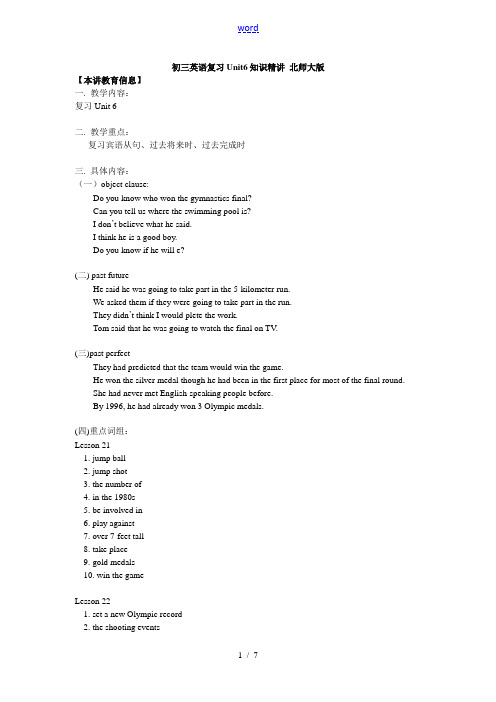
初三英语复习Unit6知识精讲北师大版【本讲教育信息】一. 教学内容:复习Unit 6二. 教学重点:复习宾语从句、过去将来时、过去完成时三. 具体内容:(一)object clause:Do you know who won the gymnastics final?Can you tell us where the swimming pool is?I don’t believe what he said.I think he is a good boy.Do you know if he will e?(二) past futureHe said he was going to take part in the 5-kilometer run.We asked them if they were going to take part in the run.They didn’t think I would plete the work.Tom said that he was going to watch the final on TV.(三)past perfectThey had predicted that the team would win the game.He won the silver medal though he had been in the first place for most of the final round.She had never met English-speaking people before.By 1996, he had already won 3 Olympic medals.(四)重点词组:Lesson 211. jump ball2. jump shot3. the number of4. in the 1980s5. be involved in6. play against7. over 7-feet tall8. take place9. gold medals10. win the gameLesson 221. set a new Olympic record2. the shooting events3. the women’s 10-meter air rifle event4. …be similar to …5. be in the first place6. e from behind7. imagine doing8. achieve the amazing success9. have sb. in …team10. be in good health11. bee a member of national team12. the World Table Tennis ChampionshipLesson 231. plete the run2. take part in3. lose one’s home4. collect money for sb.5. plenty of6. feel embarrassed7. for the two weeks before the run8. encourage sb.9. catch up with10. It takes sb. sometime to do sth.11. leave sb. behind12. wait for13. do one’s best14. keep healthy15. do regular exercisesLesson 241. host the 2008 Olympics2. be crowded with3. celebrate the success4. the Olympic movement5. have special influence6. in contrast7. two thirds of the people8. pete for hosting Olympic9. understand the spirit of Olympics【典型例题】一、单项选择1. They are those ______ bags. Please put them on the bus.A. visitorB. visitorsC. visitor’sD. visitors’2. Pass_____ the knife, please. My pencil is broken.A. IB. meC. myD. mine3. ——What else do you want?——Oh, we don’t need ________.A. nothing elseB. something elseC. more elseD. anything else4. Please keep the classroom ________.A. cleanB. cleaningC. cleanedD. cleans5. ——Li Lei did very well in the English exam.——Oh, yeah! He is ________ English.A. weak inB. angry withC. good atD. afraid of6. Walk along this road, and _____ the first turning on the right.A. getB. takeC. bringD. go7. Could you __________ me a ruler? Mine is broken.A. lendB. lend toC. borrowD. borrow from8. These pictures will show you _______.A. what does our hometownB. what our hometown looks likeC. how does our hometown look likeD. how our hometown looks like9. Do you know _______ during the ing summer holiday?A. what will Tom doB. what did Tom doC. what Tom will doD. what Tom did10. Could you tell me ______? I have something interesting to tell him.A. where is Li HongB. where Li Hong isC. where was Li HongD. where Li Hong has been to11. Mr. Zhang said he his old house and buy a new one.A. had soldB. would sellC. sold12. They never knew what to the world in a hundred years.A. will happenB. had happenedC. would happen.13. I already home when it began to rain.A. have, gotB. had, gotC. would, get14. By yesterday afternoon, five people their lives in the traffic accident.A. had lostB. lostC. would lose15. When we saw his worried face, we thought he bad news of his son.A. was havingB. has hadC. had had16. How long each other before they got married?A. had they knownB. have they knownC. would they know17. He was born________ the morning of June 1st.A. inB. onC. byD. at18. I don’t know what they are ________ about.A. tellingB. speakingC. talkingD. saying19. ——________I e here the day after tomorrow?——No. you needn’t.A. MustB. ShallC. MayD. Will20. The teacher asked the boy’s mother________ the boy out of schoo1.A. to takeB. talkC. tookD. take21. Could you tell me________ ?A. where Mary es fromB. where Mary came toC. where did Mary e toD. where does Mary e from22. She has never been to Shanghai,________?A. has sheB. is sheC. hasn’t sheD. was she23. You must study hard. or you’ll fall________.A. downB. offC. overD. behind24. He has studied English________.A. for two years agoB. since two yearsC. since two years’timeD. for two years25. Please tell me________ he is at home or at the office.A. whereB. whichC. whatD. whether26. The little boy knew that the Olympic Games________ in China.A. holdsB. is heldC. will be heldD. would be held二、句型转换。
北师大版初一(下)英语第6讲:Unit Three 语法篇(学生版)

Unit Three 语法篇____________________________________________________________________________________________________________________________________________________________________ 重点掌握可数名词和不可数名词及there be 句型的用法。
重点语法:可数名词与不可数名词一、可数名词与不可数名词的区别普通名词所表示的人或事物是可以按个数计算的,这类名词叫可数名词。
可数名词分为个体名词(表示某类人或事物中的个体,如worker, farmer, desk, factory等)和集体名词(表示作为一个整体来看的一群人或一些事物,如people,family 等)。
如果普通名词所表示的事物是不能按个数来计算的,这类名词就叫不可数名词。
不可数名词分为物质名词(表示无法分为个体的物质,如meat, rice, water, milk, orange 等)和抽象名词(表示动作、状态、情况、品质等抽象概念,如work, homework, time, health, friendship等)。
二、关于可数名词可数名词有单数和复数两种形式。
指一个人或一件事物时,用单数形式;指两个或多个人或事物时用复数形式。
名词由单数形式变成复数形式的规则如下:1. 一般的名词词尾直接加-s 。
如:book → books room → rooms house → houses day → days2. 以s, ch, sh, x 结尾的名词,在词尾加-es 。
如:bus → buses glass → glasses3. 以"辅音字母+y"结尾的名词,要先将y改为i再加-es。
如:city → cities body → bodies4. 以f 或fe 结尾的名词,要将f或fe改为v再加-es。
人教版初三(上)英语第6讲:UNIT 3 语法篇(学生版)
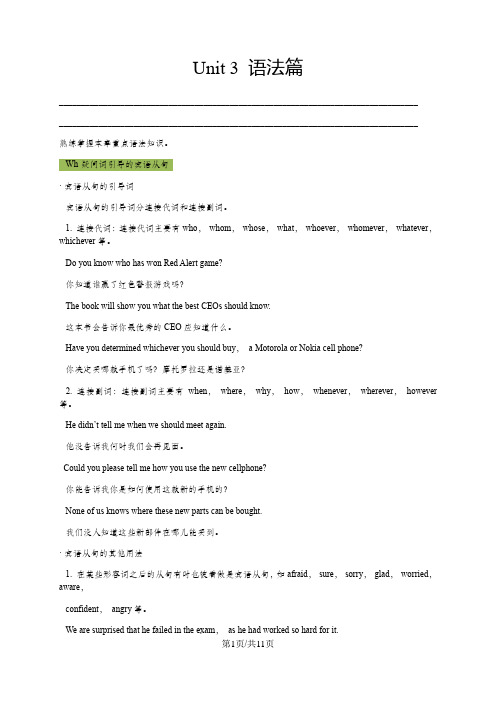
Unit 3 语法篇____________________________________________________________________________________________________________________________________________________________________熟练掌握本章重点语法知识。
Wh-疑问词引导的宾语从句·宾语从句的引导词宾语从句的引导词分连接代词和连接副词。
1. 连接代词:连接代词主要有who,whom,whose,what,whoever,whomever,whatever,whichever等。
Do you know who has won Red Alert game?你知道谁赢了红色警报游戏吗?The book will show you what the best CEOs should know.这本书会告诉你最优秀的CEO应知道什么。
Have you determined whichever you should buy,a Motorola or Nokia cell phone?你决定买哪款手机了吗?摩托罗拉还是诺基亚?2. 连接副词:连接副词主要有when,where,why,how,whenever,wherever,however 等。
He didn’t tell me when we should meet again.他没告诉我何时我们会再见面。
Could you please tell me how you use the new cellphone?你能告诉我你是如何使用这款新的手机的?None of us knows where these new parts can be bought.我们没人知道这些新部件在哪儿能买到。
·宾语从句的其他用法1. 在某些形容词之后的从句有时也被看做是宾语从句,如afraid,sure,sorry,glad,worried,aware,confident,angry等。
北师大版初二(上)英语第6讲:unit 3 语法篇(教师版)

Unit 3语法篇____________________________________________________________________________________________________________________________________________________________________理解并掌握形容词比较级、最高级的用法形容词比较级、最高级一、形容词比较级、最高级变化规则1.单音节词的变化:2. 双音节、多音节词的变化:(1) 少数以-er, ow, -ble结尾的双音节词,末尾加-er(比较级),-est(最高级)。
以-e结尾的词只加-r和-st。
eg: clever cleverer cleverest narrow narrower narrowest able abler ablest,其他双音节都在前面加单词more和most。
(2) 多音节词三个或三个以上音节的形容词只能加more和most。
例如:more/most beautiful但是,以形容前缀un开头的三音节形容词不适合上述情况,如unhappy, untidy,我们可以说:unhappier→unhappiest untidier→untidiest(3) 由--ing分词和--ed分词演变过来的形容词(包括不规则动词如know→known)只能加more或most来表示它们的比较级和最高级。
more(most) striking more(most) interesting more(most) wounded3. 不规则形式good /well better bestbad /ill worse worstmany /much more mostlittle less leastfar farther farthest /further furthestold older oldest /elder eldest二、形容词原级、比较级和最高级的用法1. 形容词原级用法:(1)修饰原级的词:very, too, so, quite(2)同级比较as + adj 原级+ as 例如:Tom is as tall as Mike. Tom和Mike一样高。
北师版初二(下)英语第6讲:Unit3语法篇(学生版)

北师版初二(下)英语第6讲:Unit3语法篇(学生版)Unit 3 语法篇____________________________________________ __________________________________________________________________________________ ______________________________________学生通过本讲学习,能够掌握本单元的重点词汇句型,并在综合能力上有一定的拓展。
在完成时的结构现在完成时由“have/has+过去分词”构成,主要有两个含义:表示动作发生在过去,但与现在的情况有联系,有时无时间状语,有时和一些表示不确定的过去时间状语连用,如:many times,just,yet,ever,never,just,already,before,so far, by now等连用。
②表示从过去某一时间开始一直延续到现在并还可能继续延续下去的动作,用于延续性动词,且句中常带有表示一段时间的时间状语,如:since + 时间点/从句,for two months, so far等。
1)现在完成时和一般过去时都能表示过去发生过的动作,但现在完成时表示过去动作对现在的影响,并且表示这一动作已完成或还可能继续下去;nice.--- Only about three weeks.A.had B.bought C.received D.borrow5. --- How long have you _________the book?--- For about two weeks.A.bought B.borrowed C.had D.lent解析:1.die"死",是非延续性动词,不能与表示一段时间的状语连用;be dead "死的",表示状态,可与一段时间连用。
北师大版初二(上)英语第6讲:unit 3 语法篇(学生版)
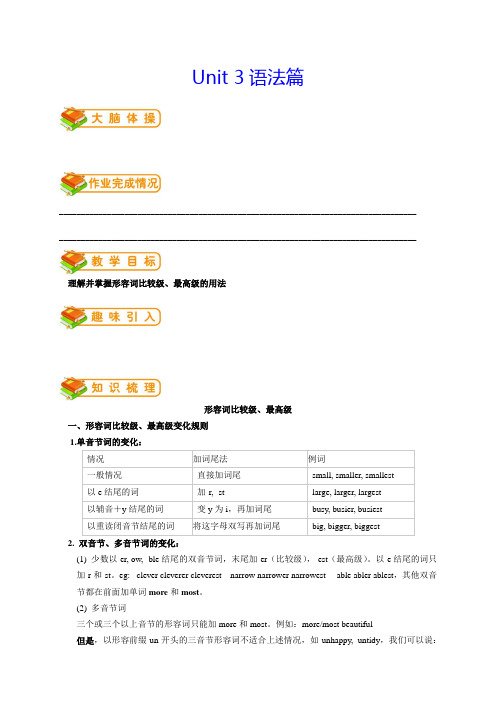
Unit 3语法篇____________________________________________________________________________________________________________________________________________________________________理解并掌握形容词比较级、最高级的用法形容词比较级、最高级一、形容词比较级、最高级变化规则1.单音节词的变化:2. 双音节、多音节词的变化:(1) 少数以-er, ow, -ble结尾的双音节词,末尾加-er(比较级),-est(最高级)。
以-e结尾的词只加-r和-st。
eg: clever cleverer cleverest narrow narrower narrowest able abler ablest,其他双音节都在前面加单词more和most。
(2) 多音节词三个或三个以上音节的形容词只能加more和most。
例如:more/most beautiful但是,以形容前缀un开头的三音节形容词不适合上述情况,如unhappy, untidy,我们可以说:unhappier→unhappiest untidier→untidiest(3) 由--ing分词和--ed分词演变过来的形容词(包括不规则动词如know→known)只能加more或most来表示它们的比较级和最高级。
more(most) striking more(most) interesting more(most) wounded3. 不规则形式good /well better bestbad /ill worse worstmany /much more mostlittle less leastfar farther farthest /further furthestold older oldest /elder eldest二、形容词原级、比较级和最高级的用法1. 形容词原级用法:(1)修饰原级的词:very, too, so, quite(2)同级比较as + adj 原级+ as 例如:Tom is as tall as Mike. Tom和Mike一样高。
【教育资料】北师大版初三英语第6讲:unit 3 语法篇(教师版)学习专用
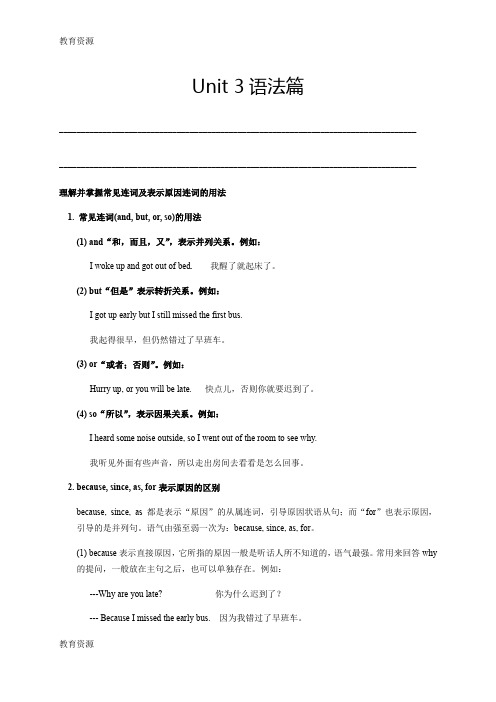
Unit 3语法篇____________________________________________________________________________________________________________________________________________________________________理解并掌握常见连词及表示原因连词的用法1. 常见连词(and, but, or, so)的用法(1) and“和,而且,又”,表示并列关系。
例如:I woke up and got out of bed. 我醒了就起床了。
(2) but“但是”表示转折关系。
例如:I got up early but I still missed the first bus.我起得很早,但仍然错过了早班车。
(3) or“或者;否则”。
例如:Hurry up, or you will be late. 快点儿,否则你就要迟到了。
(4) so“所以”,表示因果关系。
例如:I heard some noise outside, so I went out of the room to see why.我听见外面有些声音,所以走出房间去看看是怎么回事。
2. because, since, as, for表示原因的区别because, since, as 都是表示“原因”的从属连词,引导原因状语从句;而“for”也表示原因,引导的是并列句。
语气由强至弱一次为:because, since, as, for。
(1) because表示直接原因,它所指的原因一般是听话人所不知道的,语气最强。
常用来回答why的提问,一般放在主句之后,也可以单独存在。
例如:---Why are you late? 你为什么迟到了?--- Because I missed the early bus. 因为我错过了早班车。
北师大版九年级英语全册分单元知识点语法点(共9单元)(含答案)

北师大版九年级英语全册分单元知识点语法点(共9单元)(含答案)知识图谱Unit 1 Language知识精讲一、必背词汇nationality n. 国籍Australian adj. 澳大利亚的 n. 澳大利亚人Canadian n. 加拿大人adj. 加拿大的Indian n. 印度人 adj. 印度的Japanese n. 日本人;日语 adj. 日本的,日本人的Russian n. 俄罗斯人;俄语gesture n. 手势;姿势thumb n. 拇指wave v. 挥手;挥臂 n. 波浪;海浪simply adv. 仅仅,只是;简单地nod v. 点头agreement n. (意见或看法)一致;协定finger n. 手指silence n. 安静;沉默differently adv. 不同地western adj. 西方的shrug v. 耸肩shoulder n. 肩,肩膀Asian adj. 亚洲人的 n. 亚洲人bow v. 鞠躬,点头greet v. 和(某人)打招呼custom n. 习惯;风俗certain adj. 某种;肯定traveller n. 旅行者kiss v. 亲吻;n. 吻European adj. 欧洲的cheek n. 面颊,脸颊rude adj. 粗鲁的;无礼的bottom n. 底部pat v. 轻拍anger n. 怒火,怒气clap v. 鼓掌,拍手mate n. 朋友,伙伴gas n. 汽油;天然气;气体sneaker n. 运动鞋petrol n. 汽油confused adj. 糊涂的,迷惑的standard adj. 标准的,正常的 n. 标准spelling n. 拼写grey adj. 灰色的(= gray)native adj. 本地的;出生地的speaker n. 说话者;发音者;扬声器confusing adj. 难以理解的,不清楚的check n. 账单 v. 检查note n. 钞票;笔记used adj. 习惯于;用过的,旧的jumper n. (毛或棉的)针织套衫apartment n. 公寓套房tip n. 实用的提示;小费structure n. 结构chant n. 重复唱的歌词;歌谣reward v. 奖励,奖赏 n. 奖励;回报method n. 方法suit v. 适合familiar adj. 熟悉的subtitle n. 字幕phrase n. 短语,词组continuously adv.不断地,持续地image n. 图像frustrated adj. 懊丧,懊恼topic n. 主题;话题refer v. 参考;涉及table n. 表格;桌子二、重点词汇1. gesture noun /?d?est??r/1). a movement of the hands, arms, or head, etc. to express an idea or feeling手势;姿势;示意动作例句:The prisoner raised his fist in a gesture of defiance as he was led out of the courtroom.犯人在被带出法庭时,举起拳头以示抗议。
北师大版英语九年级全册Lesson6TomSawyer教学设计

3.运用问题链、思维导图等策略,引导学生深入思考,培养学生的思维品质。
4.利用多媒体教学手段,如:PPT、视频等,丰富课堂教学,提高学生的学习兴趣。
5.注重个体差异,针对不同学生的学习需求,提供有针对性的指导。
7.预习下一课:提前预习下一课的内容,为新课的学习做好准备。
作业要求:
1.学生需按时完成作业,确保作业质量。
2.家长协助监督,关注学生的学习进度,鼓励学生独立完成作业。
3.教师在批改作业时,要及时给予评价和反馈,帮助学生发现并改正错误。
4.情感态度的培养:通过本课学习,引导学生形成正确的价值观,培养良好的情感态度。
设想:结合课文内容,设计相关的讨论和活动,让学生在探讨中自然地接受情感教育。
(二)教学设想
1.导入环节:通过提问方式,引导学生回顾已学过的故事,激发学生的学习兴趣。
2.新课内容呈现:利用多媒体展示课文内容,让学生在视觉和听觉上充分感知语言材料。
四、教学内容与过程
(一)导入新课
1.教师以提问方式引导学生回顾上一课的内容,如:“Can you remember what happened in the last lesson? Who is the main character of the story?”
2.学生回答问题,教师给予表扬和鼓励,激发学生的学习兴趣。
4.布置课后作业,要求学生在课后进行巩固练习。
5.教师对本节课的教学效果进行自我反思,为下一节课做好准备。
五、作业布置
为了巩固本节课所学知识,确保学生对生词、语法、阅读和听力等方面的掌握,特布置以下作业:
1.词汇巩固:请学生将本节课所学的生词和短语整理成词汇表,并运用这些词汇造句,每个词汇至少造两个句子。
北师大版初一(上)英语第6讲:Unit Three 语法篇(学生版)--顺义刘燕
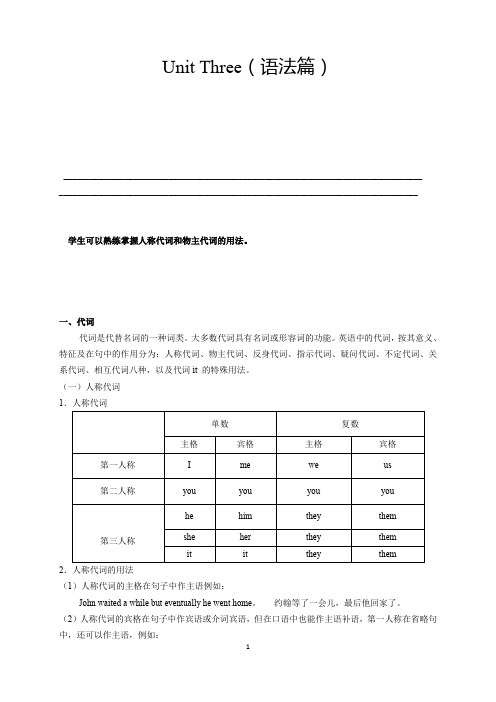
Unit Three(语法篇)____________________________________________________________________________________________________________________________________________________________________学生可以熟练掌握人称代词和物主代词的用法。
一、代词代词是代替名词的一种词类。
大多数代词具有名词或形容词的功能。
英语中的代词,按其意义、特征及在句中的作用分为:人称代词、物主代词、反身代词、指示代词、疑问代词、不定代词、关系代词、相互代词八种,以及代词it 的特殊用法。
(一)人称代词1.人称代词单数复数主格宾格主格宾格第一人称I me we us第二人称you you you you第三人称he him they them she her they them it it they them2.人称代词的用法(1)人称代词的主格在句子中作主语例如:John waited a while but eventually he went home。
约翰等了一会儿,最后他回家了。
(2)人称代词的宾格在句子中作宾语或介词宾语,但在口语中也能作主语补语,第一人称在省略句中,还可以作主语,例如:I saw her with them, at least, I thought it was her.我看到她和他们在一起,至少我认为是她。
(her做宾语,them做介词宾语,her做主语补语)3.人称代词排列顺序一般如下:(1)单数人称代词并列作主语时,其顺序为:第二人称> 第三人称> 第一人称you > he/she/it > I(2)复数人称代词作主语时,其顺序为:第一人称> 第二人称> 第三人称We > you > They注意:在下列情况中,第一人称放在前面:(二)物主代词1.表示所有关系的代词,也可叫做代词所有格。
Module6课时23Unit3Languageinuse及语法(教师版)九年级英语讲义

Module 6Unit 3Language in use 及语法目标导航重点短语 1.拒绝做某事2.积攒3.参加4.是否5.一个小角色6.因(不)做某事而警告某人重点句型 1.上课认真听,否则你将不知道要做什么。
Listen in class,or you will not understand.2.他们已经因他没有努力学习而警告他了。
They have him not working hard.3.我想参加今年学校的小提琴比赛,但是我不确定是否应该参加。
I want to the school violin petition this year,but I amnot sure I should.4.在学校话剧中,我获得了(演)主角(的机会),而琳达只得到一个小角色。
I have got in the school play,but Linda has only got asmall part.【答案】♦重点短语1.refuse to do sth.2.save up3.take part in4.whether...or not5.a small part6.warn sb.about (not) doing sth. ♦重点句型1.what to do2.warned;about3.take part in;whether;or not4.the biggest part知识精讲知识点01Eat your breakfast, or you will get hungry at school. 吃早餐,否则你在学校挨饿的。
【考点1】本句使用句型“祈使句+and/or+陈述句”,祈使句是陈述的条件,and意为“那么”,or意为“否则”。
如:Give me one more hour, and I’ll get the work finished. 再给我一个小时,我就会完成这项工作。
Hurry up, or you’ll miss the meeting. 如果你不快点,你就会错过会议。
苏版初三(上)英语第6讲:UNIT3语法篇(学生版)
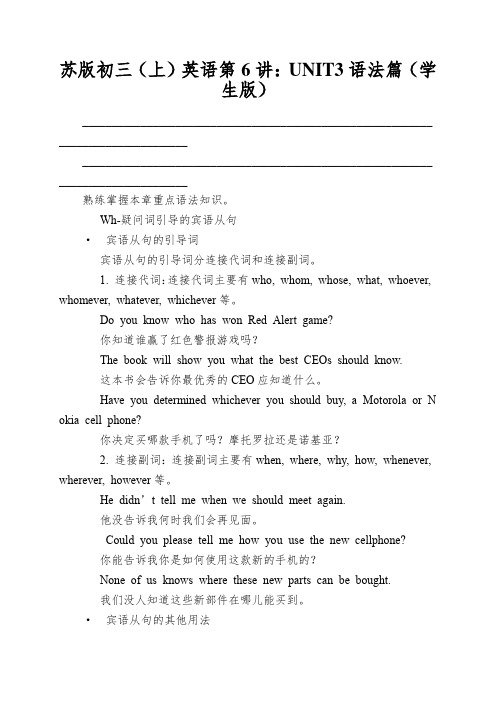
苏版初三(上)英语第6讲:UNIT3语法篇(学生版)____________________________________________________________ __________________________________________________________________________________ ______________________熟练掌握本章重点语法知识。
Wh-疑问词引导的宾语从句·宾语从句的引导词宾语从句的引导词分连接代词和连接副词。
1. 连接代词:连接代词主要有who, whom, whose, what, whoever, whomever, whatever, whichever等。
Do you know who has won Red Alert game?你知道谁赢了红色警报游戏吗?The book will show you what the best CEOs should know.这本书会告诉你最优秀的CEO应知道什么。
Have you determined whichever you should buy, a Motorola or N okia cell phone?你决定买哪款手机了吗?摩托罗拉还是诺基亚?2. 连接副词:连接副词主要有when, where, why, how, whenever, wherever, however等。
He didn’t tell me when we should meet again.他没告诉我何时我们会再见面。
Could you please tell me how you use the new cellphone?你能告诉我你是如何使用这款新的手机的?None of us knows where these new parts can be bought.我们没人知道这些新部件在哪儿能买到。
北师大版初二(上)英语第6讲:unit3语法篇

北师大版初二(上)英语第 6 讲: unit3 语法篇____________________________________________________________ __________________________________________________________________________________ ______________________理解并掌握形容词比较级、最高等的用法形容词比较级、最高等【一】形容词比较级、最高等变化规那么1.单音节词的变化:状况加词尾法例词一般状况直接加词尾small, smaller, smallest以 e 结尾的词加-r, -st large, larger, largest以辅音+ y 结尾的词变 y 为 i,再加词尾busy, busier, busiest以重读闭音节结尾的词将这字母双写再加词尾big, bigger, biggest2.双音节、多音节词的变化:(1)少量以 -er, ow, -ble 结尾的双音节词,末端加 -er〔比较级〕,-est〔最高级〕。
以-e 结尾的词只加 -r 和-st。
eg:clever cleverer cleverest narr ow narrower narrowest able abler ablest,其余双音节都在前方加单词 more 和 most。
(2)多音节词三个或三个以上音节的形容词只好加more 和 most。
比如:more/most beautiful可是,以形容前缀un 开头的三音节形容词不合适上述状况,如u nhappy, untidy,我们能够说: unhappier→ unhappiest untidier→untidi est(3)由--ing 分词和 --ed 分词演变过来的形容词 (包含不规那么动词如 know→known)只好加 more 或 most 来表示它们的比较级和最高等。
北师大版初三英语第6讲:unit 3 语法篇(学生版)
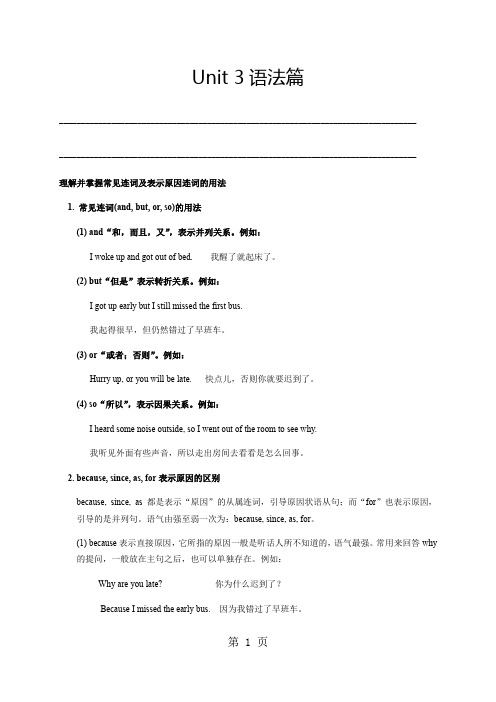
Unit 3语法篇____________________________________________________________________________________________________________________________________________________________________理解并掌握常见连词及表示原因连词的用法1. 常见连词(and, but, or, so)的用法(1) and“和,而且,又”,表示并列关系。
例如:I woke up and got out of bed. 我醒了就起床了。
(2) but“但是”表示转折关系。
例如:I got up early but I still missed the first bus.我起得很早,但仍然错过了早班车。
(3) or“或者;否则”。
例如:Hurry up, or you will be late. 快点儿,否则你就要迟到了。
(4) so“所以”,表示因果关系。
例如:I heard some noise outside, so I went out of the room to see why.我听见外面有些声音,所以走出房间去看看是怎么回事。
2. because, since, as, for表示原因的区别because, since, as 都是表示“原因”的从属连词,引导原因状语从句;而“for”也表示原因,引导的是并列句。
语气由强至弱一次为:because, since, as, for。
(1) because表示直接原因,它所指的原因一般是听话人所不知道的,语气最强。
常用来回答why的提问,一般放在主句之后,也可以单独存在。
例如:---Why are you late? 你为什么迟到了?--- Because I missed the early bus. 因为我错过了早班车。
- 1、下载文档前请自行甄别文档内容的完整性,平台不提供额外的编辑、内容补充、找答案等附加服务。
- 2、"仅部分预览"的文档,不可在线预览部分如存在完整性等问题,可反馈申请退款(可完整预览的文档不适用该条件!)。
- 3、如文档侵犯您的权益,请联系客服反馈,我们会尽快为您处理(人工客服工作时间:9:00-18:30)。
Unit 3语法篇____________________________________________________________________________________________________________________________________________________________________理解并掌握常见连词及表示原因连词的用法1. 常见连词(and, but, or, so)的用法(1) and“和,而且,又”,表示并列关系。
例如:I woke up and got out of bed. 我醒了就起床了。
(2) but“但是”表示转折关系。
例如:I got up early but I still missed the first bus.我起得很早,但仍然错过了早班车。
(3) or“或者;否则”。
例如:Hurry up, or you will be late. 快点儿,否则你就要迟到了。
(4) so“所以”,表示因果关系。
例如:I heard some noise outside, so I went out of the room to see why.我听见外面有些声音,所以走出房间去看看是怎么回事。
2. because, since, as, for表示原因的区别because, since, as 都是表示“原因”的从属连词,引导原因状语从句;而“for”也表示原因,引导的是并列句。
语气由强至弱一次为:because, since, as, for。
(1) because表示直接原因,它所指的原因一般是听话人所不知道的,语气最强。
常用来回答why的提问,一般放在主句之后,也可以单独存在。
例如:---Why are you late? 你为什么迟到了?--- Because I missed the early bus. 因为我错过了早班车。
(2) since侧重主句,从句表示显然的或者已为人所知的理由,常译为“因为,既然”,语气比because稍弱,通常置于句首,表示含有一种勉强语气的原因。
例如:Since everybody is here, let’s begin. 既然大家都在这里,我们开始吧。
(3) as是常用词,它表示的原因是双方已知的事实或显而易见的原因,或者理由不是很重要;比since语气弱,没有since正式,常译为“由于,鉴于”。
从句说明原因,主句说明结果,主从句并重。
例如:As I was not ready, they went without me.由于我没有准备好,他们没有带我去。
(4) for表明附加或推断的理由,其后的分句不能放句首,语气最弱。
例如:It mush have rained last night, for the ground is wet.昨晚一定下了雨,因为地面是湿的。
3. 其他常见连词(1)if 如果,表示条件,引导条件状语从句。
unless, 除非,如果不=if…not。
例如:If it doesn’t rain tomorrow, we will go to the park.(前半句可改为Unless it rains tomorrow)如果明天不下雨,我们就会去公园。
(2)although虽然,尽管,引导让步状语从句。
不与but连用。
例如:Although no man agreed with him, he held on his views.尽管没人赞同他的观点,他还是坚持自己的看法。
1. Tom was late for school __________ it’s raining hard.A. because ofB. becauseC. due toD. so2. Read this article, ________ you will understand that not everything can be bought with money.A. orB. soC. butD. and3. You’d better wake up Tom at 6: 30, ______ he will be late for the match.A.butB.andC.orD.so4. To make our dreams come true, we should have aims________ then try out best to achieve it.A.andB.butC.soD.or5. I didn’t go surfing, _________ it was too cold.A. thoughB. so thatC. becauseD. since6. Rick has learned a lot about Chinese culture ________ he came to China.A.beforeB.whenC.sinceD.until7. It is dark, _______ let’s go home.A. soB. andC. butD. and8. __________ I’m a little disappointed, I can still accept the result.A. SinceB. BecauseC. AlthoughD. For9. We will stay at home, ________ there is a traffic jam tomorrow.A. ifB. unlessC. butD. because10. ---Hello, Joyce, you are busy. Can I give you a hand?---Thanks very much, _________ I can manage.A.andB.butC.orD.so基础演练根据句意及首字母或汉语提示或用所给词的恰当形式填空。
1.I’m afraid we have to c _______ (取消) the meeting.2.A number of useful________(invent), such as smartphones, have changed our lives.3.Tom has gone to Italy, he is a__________ from the meeting.4.Inner Mongolia lies in the n__________ part of China.5.Qian Xuesen is one of the greatest________(开拓者)of China’s space technology.6.I d_______ with Lucy; we have different opinions on the problem.7.Now more and more teenagers p_______ the old with seats on the bus.8.It was in great d_______ to keep the babies in the car alone.9.I wonder who is the o_______ of the car.10.There are many new ways of producing _________(能量), such as, wind and solar power.巩固提高一、根据中文提示完成句子(每空一词)1.孩子们得益于每天的眼保健操。
The children ________ _________ daily eye exercises.2. 我们应该减少街上汽车的数量。
We should________ ________ ________ ________ _________the cars in the street.3.詹妮一点儿也不喜欢科技。
Jenny_________ _________technology _______ _______.4.一些发明帮我们活得更好,寿命更长。
Some inventions________ __________ _______ _______ ________ ________.5.北京以悠久的历史和名胜而闻名。
Beijing _____ _______ ______ its _______ _______ and places of interest.6. 众所周知中国有四大发明。
_____ ______ ______ ______, there are four great inventions in China.7.由于污染变得越来越严重,中国政府下定决心解决这个问题。
Since pollution is getting more and more serious, Chinese government ______ _______ ______ _____ _______ _______ ________the problem.8. 你每天花多长时间听英语?______ ______ ______ _______ _______ ________ ________ English every day?二、按要求完成下列句子1. How about telling stories to cheer up the sick kids ?(改为同义句)_______________________________________________________2. They have seen the film already. (改为否定句)_______________________________________________________3. It’s about 2 kilometers from my home to school. (对画线部分提问)_______________________________________________________4. My cousin bought a new bike last week. (改为同义句)_______________________________________________________5. 只要你努力工作,你的梦想就会实现。
(翻译)________________________________________________________一、单项选择1. ---Is this your father’s car?---No. _______ car is black.A.MyB.HisC.HerD.Your2. You can take ________of the two toys cars and leave the other one for your brother.A.bothB.noneC.eitherD.neither3. Is there _________ useful on science? I’m looking for information abut this topic.A.everythingB.somethingC.anythingD.nothing4. ---Did you catch the first subway this morning?---No, I didn’t. It had started moving________ I could get on it.A.beforeB. sinceC.afterD.as soon as5.---Did you have a good time at the party?---Yes. We sang ________ danced until late at night.A.butB.ifC.orD.and6. Lin Shuhao is________ famous _______ all the basketball fans in China know him.A. too; toB. so; thatC. enough; toD. as; as7. Practice more, ________ you’ll do better in playing chess.A. butB.andC.whenD.after8. There will be _______ cars in the city because people will prefer the subway.A. fewerB. moreC. lessD. most9. Of all he drinks, tea is _______ in the world. It has over 5,000 years of history in China.A.olderB.oldestC. oldD. the oldest10. Doing eye exercises _______ one of the useful ways to protect our eyes.A.isB.areC.wasD.were二、完形填空The first time I saw Suzy Khan, I knew I had to help her. She was really small for her age of 12. The boys in my class often laughed at her. She would open a 1 , pretending to read, with tears dropping on the open page.All I knew was that she was an orphan (孤儿) from Africa. She had just been adopted(收养) by a family, and they thought that the best way for her to 2 American ways of life is to be with American kids. I looked 3 at this small girl and promised myself that I must help her.But how could I help her fit in with us? There had to be a way.One day, when I went into the classroom, I saw that Suzy had opened her geography book to a picture of a train, and in her notebook, she had made a perfect 4 .I was surprised and thought that she could do 5 in the coming talent show. So, I took her to see the art teacher, Miss Parker, and showed her what Suzy had drawn. “Why, it’s 6 ,” said Miss Parker, and then showed us a poster she had painted for the talent show. “I need more of these, but I just don’t have enough time. Could you help me, Suzy?On the day of the talent show, Suzy’s7 were everywhere ---- all over the hall and all over the school, each one different.“And8 ,” said Mr. Brown, the schoolmaster, at the end of the show, “We have a special award. I’m sure you’ve all noticed the wonderful posters.” Everyone nodded. “One of our own students painted them.”I could hear everyone whispering. “Who in our school could9 tha t well?”Mr. Brown waited a while before saying, “Since this student worked so hard on the posters, she deserves a prize, too. Our mystery (神秘) artist is our new student ---- Suzy Khan!”Mr. Brown thanked her for all the wonderful posters and gave her a pr ofessional artist’s set. “Thank you,” she cried.I realized, at that time when I was looking at her 10 face, she’d probably never owned anything in her whole life.Everyone started to clap their hands. Suzy Khan gave them a shy smile. I knew then Suzy was going to be all right. ”1. A. bag B. book C. box D. bottle2. A. learn B. borrow C. stay D. send3. A. near B. up C. down D. opposite4. A. copy B. note C. train D. photo5. A. something B. anything C. everything D. nothing6. A. colorful B. common C. ugly D. wonderful7. A. photos B. books C. poster D. gifts8. A. importantly B. finally C. sadly D. hopefully9. A. draw B. make C. write D. think10.A.sad B. beautiful C. small D. excited__________________________________________________________________________________________________________________________________________________________________一、单项选择1. When I_______at the bus stop, I realized I had left my backpack at home.A. arrivedB. arrivesC. will arriveD. was arriving2. My mother usually goes out for a walk after she finishes______the dishes.A. doingB. doneC. doD. to do3. We _______English for many years and we consider it important.A. learnB. learnedC. have learnedD. will learn4. All our compositions _________by Mr. Li yesterday afternoon.A. checkB. checkedC. are checkedD. were checked5. I think he is one of ________photographers in the world.A. goodB. betterC. bestD. the best(附:单选1-5, 2014海淀区九年级第一学期期末练习)二、阅读理解AInventions All Around UsEvery invention has a story. These stories often have a lesson to teach, too. Here are the stories of some everyday household inventions.Canned Food and the Can Opener—Get It Right!Peter Durand invented canned food in 1810, but there was a problem. Durand didn't have a good way to open the cans. In 1858, Ezra Warner invented a can opener. It used a piece of metal to cut and remove the top from the can, but it was difficult to use. Finally, in 1870, William Lyman added a wheel to the can opener. The metal went around the top of the can and removed it easily. Finally, people were able to open cans without a lot of work. Canned food was soon popular.Frozen Food—A Little Good Luck Can Help!Clarence Birdseye had the chance to go on a trip to如e Arctic. When people there caught fish, they put the fish in a container (容器) of ice to freeze it quickly. When people cooked the fish later, it was still good! This gave Birdseye an idea. He thought people could also have this kind of food at home. In 1926,Birdseye invented frozen food. People were able to store food in freezers for a long time.Air Conditioning—One Answer to Two Problems!Printing companies make books, so they use a lot of paper. Sometimes, changes in the weather can hurt the paper. In 1902, Willis Carrier invented air conditioning to control the temperature inside his printing company. This saved the paper. People soon realized other benefits of air conditioning. They started to air condition their homes in the summer. Carrier's invention changed the world!1. When was canned food invented?A. In 1810.B. In 1870.C. In 1902.D. In 1926.2. After the trip to the Arctic, Clarence Birdseye invented ____________.A. canned foodB. can openersC. frozen foodD. air conditioning3. Changes in weather _____________ in Willis Carrier's company.A. helped to keep foodB. hurt printing paperC. caused health problemsD. made rooms comfortable4. According to the passage, which of the following may lead to inventions?A. People's needs.B. Public support.C. Modern technology.D. Practical suggestions.BLooking for an original way to raise money for charity? Has your school run out of clever and fun ideas? Don’t give up. There are several ways to support your favorite charity and enjoy yourselves at the same time.How about holding a bean bath competition? “How does this help?” you may ask yourselves. Well, it’s very simple really- you agree to sit in a bath full of bakedbeans, then for every minute you stay in it, people pay money! The longer you stayin the bath, the more money you collect for the charity your school has chosen! It’sextremely messy, but it’s good fun! Just a piece of advice, though. Let your parents know what you’re doing. Wear old clothes because they’re going to need washing after the competition!Here’s another idea that we used at my school: organize a car wash.Everybody who has a car sooner or later washes it or has it washed. So why don’tyou and your classmates do the job? The money the car owners pay for having theircars washed will go towards your charity. When we did it, we had an amazing time! At first, some of us were worried about getting wet or dirty and it’s true. But we also had fun, and at the end of the day it was really worth it!On the other hand, if you don’t feel like getting wet or messy, but have some musical talent, how about organizing a street concert? Street musicians can make alot of money and so can you if you’ve got the talent and courage it takes to play infront of an audience. You just need to find a suitable place (make sure you’reallowed to play music in that public place), practise for a few hours with your friends first, and give it a try!I hope all these ideas have helped you a bit, and if you’ve got any othe r great suggestions, we would love to hear them. We can publish them, so other people can use them, too. Good luck!5. Holding a bean bath competition, you would___________.A. ask yourselves many questionsB. sit in a bath full of baked beansC. put on old clothes after the bathD. ask your parents to wash the clothes6. What did the writer think of the car wash?A. He thought they could have fun.B. He was upset about getting wet.C. He thought many students were too worried.D. He thought it was an easy way to collect money.7. From the passage we can know the writer is a ___________.A. parentB. studentC. driverD. singer8. The writer writes this passage to_____________.A. ask readers to do something funny for charityB. tell readers about charity events they can go toC. suggest fun ideas for people to raise money for charityD. show some ways for people to organize charity eventsCFor me, Facebook is about staying in touch with friends, whether thatmeans writing on someone’s ‘wall’or sending them a private message. It’s auseful website for finding long-lost friends, arranging parties and sharingphotos. But that’s not all: Facebook is now being used by all kinds of peoplefor all kinds of reasons!Do you want to play computer games? Log on to Facebook. There are now thousands of entertaining games and puzzles to help you pass the time. Do you want to find cafés, cinemas and bowling alleys in your area? Log on to Facebook pages that you can join and ‘like’, which makes it very easy to search for fun things to do near you. I think it’s brilliant to have all the information that you want on just one website!People are now joining Facebook to make professional connections too, either with people who do the same kind of work, or with businesses that are looking for new people to work for them.It’s a pretty good idea since so many people use Facebook these days, especially young people! Even students log on to Facebook to look for summer or part-time jobs.And that’s not all! Now there are hundreds of pages about sports teams, TV programmes and pop stars to look at on Facebook. However, I believe the main reason most young people use Facebook is because it’s so easy to let the world know what you think about different things or people, whether it’s about a newfilm at the cinema or whether you prefer Rihanna with long or short hair. You can even write comments directly on other people’s Facebook pages including some stars’ pages. But you have to be careful because giving your opinion online can be dangerous.We mustn’t forget that Facebook is meant to be fun and shouldn’t be used for saying bad things about people around us. I recently read a news article about a student who had to leave school because she made rude and unfair comments about a teacher on her Facebook wall. Several other school students have been in trouble for similar comments and opinions. In fact, it really annoys me when I see somebody has writtenIt’s true that Facebook is becoming more and more part of our daily lives for many different reasons, and it can be really helpful as well as being a lot of fun. But, as with all websites, we must be careful about how we use it.9. What does the writer think of the Facebook?A. It is easy for finding a long-lost friendB. It is dangerous for giving one’s opinionC. It is mainly used for business reasons these days.D. It is useful for finding entertainment information.10. Why does the writer think young people like Facebook so much?A. It’s a good place to read TV programmes reviews.B. They can have conversations about their interests.C. It’s the best place to find information about sports.D. They like having the chance to give their opinions.A. criticalB. privateC. unpleasantD. impolite12. What is the best title of the passage?A. The use of FacebookB. The information on FacebookC. The reasons of using FacebookD. The suggestions for using Facebook课程顾问签字: 教学主管签字:。
